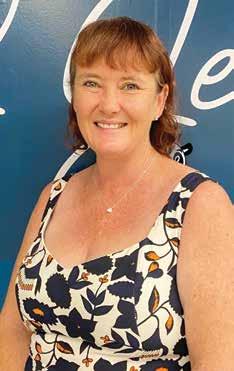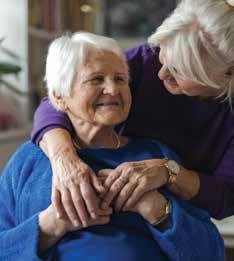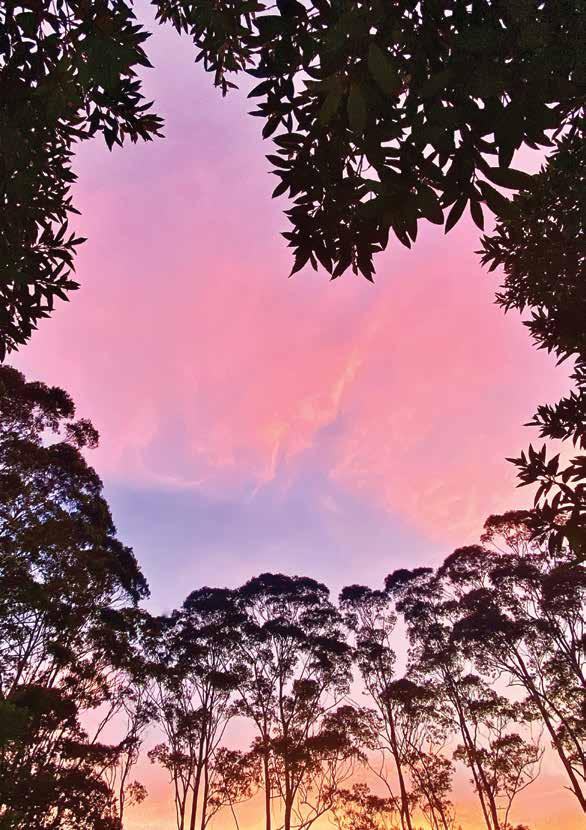Respect and dignity
Salvos committed to dementia care
possible

Vol. 004 | No. 35 23 September 2023 AUD $1.00 PRINT POST APPROVED PP100001474 salvosonline.org.au FEATURE Holistic aged care FAITH TALK The hope of spring MY STORY The
life
best

“Flowers don’t worry about how they’re going to bloom. They just open up and turn toward the light and that makes them beautiful.”
– Jim Carrey
What is The Salvation Army?
The Salvation Army, an international movement, is an evangelical part of the universal Christian Church.
Vision Statement
Wherever there is hardship or injustice, Salvos will live, love and fight alongside others to transform Australia one life at a time with the love of Jesus.
Mission Statement
The Salvation Army is a Christian movement dedicated to sharing the love of Jesus by:
• Caring for people
• Creating faith pathways

• Building healthy communities

• Working for justice
The Salvation Army Australia acknowledges the Traditional Owners of the land on which we meet and work and pay our respect to Elders, past, present, and future. We value and include people of all cultures, languages, abilities, sexual orientations, gender identities, gender expressions, and intersex status. We are committed to providing programs that are fully inclusive. We are committed to the safety and wellbeing of people of all ages, particularly children.
Dementia is the second leading cause of death in Australia after coronary heart disease, and the leading cause of death for women. For people living with dementia and their loved ones, the experience can be a challenging one in so many ways but help and support is out there.
Founders William and Catherine Booth
Salvation Army World Leaders
General Lyndon and Commissioner Bronwyn Buckingham
Territorial Leader Commissioner Miriam Gluyas
Secretary for Communications and Editor-In-Chief

Colonel Rodney Walters
Publications Manager Cheryl Tinker
Editor Simone Worthing

Graphic Designer Ryan Harrison
Enquiry email publications@salvationarmy.org.au
All other Salvation Army enquiries 13 72 58
Press date 8 September 2023
Printed and published for The Salvation Army by Commissioner Miriam Gluyas at Focus Print Group, South Granville, NSW
The Salvation Army Aged Care (TSAAC) centres are among those providing specialist care for people living with dementia, as well as education and support for their families and carers. There is so much to learn about the causes of dementia, symptoms and ways of responding to the needs of those living with the condition.
As this edition highlights, the Salvos are focused on providing holistic care in this space and making sure residents in their centres, and clients receiving home care, are supported through this journey.
Chaplain Cheryl Kinder writes about the love of God that underpins all that takes place in TSAAC centres and programs, and the focus on making sure each person feels loved and valued and finds meaning, purpose and connection each day.
For more information, go to agedcare.salvos.org.au

3
CONTENTS
Story
Feature [4]
Simone Worthing Editor Loved and valued My
[12] The best life possible Faith Talk [10] The hope of spring
Holistic approach to aged care
The Salvation Army is about giving hope where it’s needed most.
salvosonline.org.au
Salvos Magazine
Holistic approach to aged care
Across Australia, person-centred policies are the keynote of programs at The Salvation Army Aged Care centres

Dementia Action Week, 18-24 September 2023, is drawing to a close. The theme, ‘Act Now for a Dementia-Friendly Future’ is one that The Salvation Army Aged Care (TSAAC) takes seriously across all its 21 residential aged care centres.
Salvos Magazine recently spoke to Margaret Williams, Manager – Clinical Procedures and Practice Excellence for TSAAC, about her work, with a focus on caring for those experiencing dementia, and their families.
Salvos Magazine: How did you become involved in working for The Salvation Army’s Aged Care centres?
Margaret Williams: I grew up in Sydney and moved to the Kimberley in WA, working in a remote Aboriginal community with the intention of returning home in one to two years. I worked in the Kimberley and Darwin and 17 years later I returned to Sydney. I was looking for jobs and saw one advertised with The Salvation Army Aged Care. My career had been varied over the years but the last time I had worked in aged care was at Macquarie Lodge, one of the Salvos Aged Care centres, when I was at university.
I’m the Manager, Clinical Procedures and Practice Excellence for The Salvation Army Aged Care centres around Australia. One of the challenges is that the Salvos have 21 aged care centres in seven states and territories. I write the policy documents that need to meet the differing requirements in each state. My role also involves assistance with incident investigation, education, compliance and accreditation.
I’m a registered nurse by profession. It was an interesting time to come into aged care, particularly with policy and
accreditation. When I started, it was in the middle of the pandemic and there were different regulations in every state. It was also not long after the Royal Commission into Aged Care, so there were new standards and requirements for all providers, and it was interesting to navigate all that.
SM: Is most of your work done behind the scenes or in the centres?
MW: I write policies, send them out to the centres and talk to centre and care managers to make sure that the care we’re providing is best practice but also person-centred and works for the consumers and for the staff. I also work with our teams in Salvos Home Care and our retirement villages.
FEATURE
Our centres are full of beautiful, committed people who really enjoy their jobs and care about those they look after
SM: In working with those with dementia, is there anything that delineates The Salvation Army from other aged care providers?

MW: A lot of our centres have designated dementia units and provide education to our staff. It’s a challenging space, and the dementia journey is different for every person and their families, so you can’t have a one-size-fits-all approach.
It’s about looking at individualising our care and services for the person, which can be challenging. But our staff are trained to identify people’s needs and understand their behaviours and what might help each individual.
SM: Do you have chaplains or ministers who are able to look at the spiritual side of aged care?
MW: Yes. We’re very big on making sure our care is holistic, and we have a chaplain at each centre. The chaplain conducts a spiritual assessment with every person so we can find out what has been important to them. If it’s a particular religion, for instance, we ask what parts of that religion are important to them.
We also have lifestyle staff at all our centres and residents do a whole range of activities during the day – anything from movies to karaoke to cooking classes and gardening groups.
SM: What are some of the stereotypes and myths around aged care that it would be good to have busted?

MW: I think the environment around aged care is a bit of a myth. A lot of people see it as hospital wards where people are just sitting in rooms, whereas in most of our centres the environment is beautiful. We have outdoor areas with
sensory gardens and beautiful views, and lots of sitting rooms and activity rooms.
Another of the myths in aged care is around food. You always hear, much like you do with hospitals, that the food is terrible. But we have chefs on-site at all our centres and put a big focus on what we call the dining experience.
SM: Is there anything you would like to add about the ageing journey?
MW: People are living much longer and from an aged care perspective we really understand that now. Just because somebody’s older doesn’t mean they shouldn’t have choice, and that they shouldn’t have a say in their care and their life.
Lots of families feel guilty about putting people into aged care or they’re worried
FEATURE
23 S EPTEMBER 2023
Margaret leads a committed and experienced aged care team.
about whether they’re going to be able to be involved in their care. It’s really important for significant people in the person’s life to be involved in their journey as well, so they can maintain those relationships.

SM: What are some of the personal joys in your job?
MW: I love it! Members of the team in head office are great to work with –everybody’s very collaborative and our passion is to ensure that we do aged care well. We’re all on the same page and it’s evident that we don’t want to just be good at things, we want to always do better.
Our centres are full of beautiful, committed people who really enjoy their jobs and care about those they look after.
SM: Does The Salvation Army have plans to develop aged care?
MW: We are always working on improvements. It’s definitely a growing area and there’s absolutely a growing need throughout all levels of society.
Lots of our centres have waiting lists and it’s certainly an area that people sometimes struggle to get into. We want to ensure that there is equitable access for everyone. All people deserve to be cared for well as they age.

It’s going to be a challenge in the future, but The Salvation Army is absolutely committed to trying to ensure we meet the need.
Scan here for more information on Salvation Army services.
FEATURE
It’s about looking at individualising our care and services for the person …
The Salvation Army Aged Care
Caring for older Australians
The Salvation Army Aged Care (TSAAC)* provides care and support services to older Australians, whether living independently in their own homes, in our Retirement Living communities or Residential Aged Care centres.
380 units of Retirement Living apartments
1783+ Residential Aged Care centre capacity (number of residents provided for at one time)
more than 97,500 Home Care visits provided by Salvos Home Care personnel
1870+ TSAAC personnel including officers (pastors) in August 2022
7 (STATISTICS FROM THE SALVATION ARMY AUSTRALIA ANNUAL REPORT 2022) NEWS
23 S EPTEMBER 2023
Support through the storms of life
Chaplains provide emotional and spiritual support for residents, families and staff at The Salvation Army Aged Care centres
 By Cheryl Kinder
By Cheryl Kinder
One of the most important things as we age is to find meaning, purpose and connection. This is not easy when so many things are changing around us –loss of independence and isolation from loved ones or familiar surroundings. This can be overwhelming and feel like a storm is raging around us.
One thing that helps us to engage with or embrace something new is to find meaning and purpose in each day, something that we can contribute to or that brings us joy. It’s also important to find opportunities to connect by meeting new people or just joining in an activity where you feel you belong.
We all need to feel that we are valuable and that we matter. We all need to know that we have others we are connected to. But how do we do this when we are in the storm and feel like we are struggling with so many daily challenges?
VALUABLE AND LOVED
I am reminded of the scripture where Jesus is in the boat with his disciples being tossed by the waves in a storm. The disciples are fearful and question whether Jesus cares; in that moment they forget who Jesus really is (Mark chapter 4, verses 35-41). Sometimes it’s easy to forget that Jesus is with us even in the storms. He wants us to know that we are valuable and loved.
Everything we do at The Salvation Army Aged Care (TSAAC) is underpinned by our love for God. TSAAC exists purely because of its mission, its passion to care for and support people through all stages of their lives. We want to reach out and show love because of the love that Christ has shown us.
SPIRITUAL CARE
The role of a chaplain is a year-round commitment to provide pastoral care, spiritual and emotional support for residents, staff and their families. For those without a faith background, the chaplains on-site help people feel connected and find meaning and purpose.
SALVOS MAGAZINE 8 FEATURE
The chapel services also provide an opportunity for people to find meaning, to come together, build relationships and share in worship. Whether they have any faith or no faith, all are welcome to attend any of the activities that the chaplain promotes.
Everything we do at The Salvation Army Aged Care (TSAAC) is underpinned by our
Regardless of whether a resident has an expression of Christian faith, spirituality is nurtured by each of the centre’s chaplains. It’s about helping them live their best life in this stage. For some residents, this may include connecting to their cultural or linguistic background.
We’re certainly wanting to support everyone in whatever way we can.
Our residents have so much to share with us and it is a privilege to be able to learn from them.
Many of our residents don’t have family, or anyone to support them – they see the chaplain as someone that they feel connected to, someone they can share with, and there is absolutely no judgment. Similarly, families appreciate access to the chaplains. Chaplains support families and residents during the end-of-life process when their loved ones are palliating. This is an honour and a privilege that we don’t take lightly.
Major Cheryl Kinder is a Salvation Army officer (pastor) and Mission and Chaplaincy Manager – Salvation Army Aged Care

9 FEATURE
here for more information on Salvation Army services. 23 S EPTEMBER 2023
love for God.
Scan
“The whole earth sprouts newness and life in the springtime, and green shoots break through the well-seeded garden soil. That’s what it is like with the Eternal’s victory – the Lord will cause justice and praise to sprout up before all the nations, for all peoples to see.”
Isaiah chapter 61, verse 11 The Voice Bible translation

FAITH TALK SALVOS MAGAZINE 10

FAITH TALK 23 S EPTEMBER 2023 11
The best life possible
Colleen’s passion is helping people living with dementia
As part of Dementia Action Week, 18-24 September 2023, Salvos Magazine spoke to Colleen Fitz-Gerald about her role with the Salvos and her passion for people living with dementia.
Salvos Magazine: What is your role in The Salvation Army’s aged care program?
Colleen Fitz-Gerald: I’m the Clinical Learning Specialist – Manager of Education across residential, home care and retirement villages of The Salvation Army. Initially my job was meant to be clinical education because I’m a registered nurse, but it now encompasses other things like manual handling, codes of conduct and new staff orientation.
I develop all different kinds of resources and competencies in medication, wound management, hand hygiene and PPE (personal protective equipment).
I’m based in Sydney and travel around the country to residential centres and home care hubs to train staff. The people in home care are clients and
those in residential centres are residents, and I work with both cohorts.
SM: What motivates you to work in aged care?
CF: I’ve been working in aged care for about 25 years. I love being part of people’s final journey and making that as good as it can be.
My underlying passion is for people living with dementia and I love working with them and giving them the best life
HELPFUL RESOURCES
• Dementia Support Australia –dementia.com.au
Call: 24-hour helpline 1800 699 799
Webchat: dementia.com.au/ helpline/helpline-webchat
• Dementia Australia –dementia.org.au
Call: 24-hour National Dementia
Helpline 1800 100 500
Webchat: dementia.org.au/ helpline/webchat
App: Ask Annie
• My Dementia Companion –mydementiacompanion. com.au
SALVOS MAGAZINE 12
MY STORY
My underlying passion is for people living with dementia …
they can have. I enjoy teaching staff that the very best way you can care for any person is being person-centred – really getting to know them.
The other important concept that I teach the staff is to make that person’s own reality okay for them. For a person with dementia, it’s very real that they think it’s 40 years ago and they need to pick the kids up from school. So, I advise the staff to forget actual reality and to meet the person where they’re at. I teach carers different things to say to distract the person and get them talking about their memories.
SM: What are the main causes of dementia?

CF: There are so many different causes of dementia, and it’s such an umbrella term, but it’s very closely connected to lifestyle and diet – hereditary dementia is on the lower end of the causes and more rare compared to other forms of dementia. We’re seeing a lot more alcohol-related dementia and dementia caused by sporting injuries. And because our lifestyles have changed for the worse over recent decades, in my opinion, we’re going to see a lot more of this.
Dementia is the second leading cause of death in Australia after coronary heart disease, and the leading cause of death for women.
SM: How important is lifestyle?
CF: I think lifestyle has the biggest impact. We can’t change our genetics but we can change our lifestyle. At a recent conference I attended, a man with Alzheimer’s disease spoke to the audience about his lifestyle and changes he implemented, tracking everything he was doing. It was interesting to hear his
observations about his lifestyle, and how changes he was making improved it.
SM: How can people in the community become more understanding and respectful of those living with dementia?
CF: Acceptance is absolutely key, as is knowledge. We need to be better informed about the disease and the ways we can help people living with dementia.
South Australia has just opened a dementia village similar to one in Norway where the whole community is dementia-friendly. Supermarkets have been set up to help someone who’s struggling with money. Tasmania is starting a similar project as well.
It’s my dream to have something like that someday, where people with dementia can be happy because the disease doesn’t totally impact their lives.
Scan here for more information on Salvation Army services.
13
MY STORY
23 S EPTEMBER 2023
Colleen has been working in aged care for 25 years.
Easy biscuits
Ingredients
120 g butter, ¾ cup sugar, 1 egg, 1½ cups self-raising flour, jam of your choice (optional)
Method
• Pre-heat oven to 180°C.
• Melt butter and sugar. Set aside to cool.
• Beat egg and add to cooled butter and sugar mix.
• Stir in flour.
• Drop small spoonsful of batter onto a greased or lined oven tray.
• If desired, make a small dent in each biscuit and fill it with jam.

• Bake for 15 minutes or until golden.
Quick quiz
1. What is the start of a river called?
2. What colour skin do the Amazon River dolphins have?
3. How much of the world’s water is held in rivers and lakes?
4. What river did Audrey Hepburn sing about in the movie ‘Breakfast at Tiffany’s’?
5. What is the deepest river in the world?

6. Which river travels through China, Myanmar, Laos, Thailand, Cambodia and Vietnam?
Bible byte
“Wisdom belongs to the aged, and understanding to the old.”

Job chapter 12, verse 12 New Living Translation
On which page of this week’s Salvos Magazine is Tum-Tum hiding?
SALVOS MAGAZINE TASTE OF LIFE 14 SALVOS MAGAZINE TASTE OF LIFE
HAve a laugh
What animals fear vacuum cleaners?
What’s a rabbit’s favorite type of music?
What’s a rabbit’s favorite game?
World Rivers Day is held annually on the fourth Sunday of September.
It was established by Canadian environmentalist Mark Angelo in response to the United Nations’ Water for Life Decade (2005-2015) to promote awareness of the need to care for the world’s water resources.
Words are hidden vertically, horizontally, diagonally, forwards and backwards.
Roe River, in Montana USA, is the world’s shortest river at 61m long; the Nile is the longest at 6650km.
is peeking over Margaret’s shoulder on page 5.
15
TAKE FIVE 15
Quiz :answers 1.
2. Pink 3. Less than 1%
Source
4. Moon River
5. Congo 6. Mekong River
Wordsearch
Tum-Tum:
Basin
Channel Clarence Congo Cotter Creek Derwent Estuary Flinders Floodplain
Mitchell Molonglo
Rivers
Swan Todd
Waterway L H P I C K L E S P A N I N I U B R I E B C H E D D A R A U A J J T A U S T R A L I A M S D R L A M J G C A V O C A D O H L X T Y F A Q W I J K J B Z T D Y D C Y K F Y S T A F F A B T J S M H T V C O O M O B R O F I V J O Y O C B H R N A A A A N F R U R K M W M R E D N R S T N D L Z T S A V I N E E A A G T T C U E A D T C H N Y A S B I A I A E E D O O D P A T Q D E L S R E Z Q E M J P N R M E T O F E E I F U L E S W I T Z E R L A N D H N P L L I T A L Y C C O M F O R T E A T I G R U Y E R E B U T T E R I J
Enjoy!
Canal
Gascoyne
Mouth Murray Murrumbidgee Nile
Source
Tributary
Hip-Hop
Dust bunnies
Hopscotch M H Z E C G B D S O B A S I N O M U C V S R A C H A N N E L K K U C R O K T E S M K L M F O B X R G A R T F U E C O X O L E Z T R I D N U T T A K O D L I G C R A M V C A M E O R I Y O N S O I Y P O E N L B R D Y Y N D W T B S F V U R U L I X D N G E A V U U Q N H T S T P D C W L R N D T Q G U C O H I S Q G O O S D E A R C L A R E N C E L E N H C R R E N A D P S A C W U G E G N W Y Q W U D G W A T E R W A Y O E Q E I E N I L E K I P J C S J N Y H F L O O D P L A I N Q J D T E Y M I T C H E L L S O U R C E G 23 S EPTEMBER 2023

“If you look the right way, you can see that the whole world is a garden.”
– Frances Hodgson Burnett










 By Cheryl Kinder
By Cheryl Kinder







